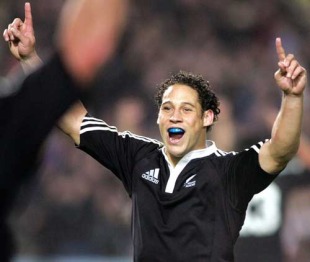|
New Zealand Rugby
Safeguarding the Maori's future
Huw Turner
March 22, 2010

Luke McAlister celebrates the Maori's victory over the Lions in 2005
© Getty Images
Enlarge
The twin announcement of a new coaching team and a June programme of international competition appears to bring Maori rugby out of the shadows in this, its centenary year. For many British & Irish Lions fans one of the abiding memories of the 2005 tour of New Zealand remains the demolition of the tourists at the hands of a compelling and ruthless Maori side in Hamilton. Since its inception in 1910, the Maori side has never offered anything other than the severest test to visiting opponents and All Black history is adorned by the exploits of any number of Maori rugby greats: George Nepia, Sid Going, Tane Norton, to name just three. While these names will be very familiar, what will be less well-known, I am sure, is that a team termed the New Zealand Natives was the first overseas team to tour the United Kingdom in 1888-89. Initially, the team was meant to include only Maori players, but four non-Maori players were included before departure to 'strengthen' the side. The tour statistics make for unbelievable reading: the team played three or four times a week for a total of 74 games. They won 49, drew five and lost 20. Ireland were beaten 13-4 in Dublin, Wales defeated the tourists 5-0 in Swansea and England won 7-0 at Blackheath. The haka, first performed against Surrey in October 1888, and the all black strip were other iconic legacies from that extraordinary 25-week tour of the UK. The Maori renaissance of the past 20 years has seen a broadening and a deepening of Maori cultural roots within New Zealand society. At one time selection for the Maori rugby team was relatively relaxed. Players who looked Maori, but had no Maori blood, were often selected in the team. Today, it is a requirement that a potential player has to have Maori whakapapa or genealogy and this is strictly applied. However, despite the richness of its history, and the extent of its contribution to New Zealand and world rugby as a whole, it has often felt during the era of professional rugby that the New Zealand Rugby Union is unsure of what to do with Maori rugby. It appears not to know where it fits within the professional scheme of things. In some ways these uncertainties, these dilemmas, are not so very different from the challenges faced by the Lions. Everybody loves the Maori rugby team, but they rarely make an appearance. Perhaps in these days of franchise rugby, fixture congestion and the over-exposure of a finite pool of players through satellite television coverage, the relative scarcity of Maori appearances is precisely its appeal. It offers freshness, variety within a rugby diet which has become numbingly familiar. So, while the week's announcement of Jamie Joseph and Daryl Gibson as the Maori side's coaching team, and fixtures against Ireland, England and one other (possibly Wales?) is welcome, there are concerns emanating from the announcement. It seems extraordinary that the first fixture on June 12, in Whangarei, will be against as yet unannounced opponents and that the coaching appointment comes after months of uncertainty and speculation in the rugby community. Many elements within the international rugby calendar are fixed months, sometimes years, in advance. While the fixtures against international opposition are to be applauded in showing respect to the legacy of Maori rugby, a concurrent programme of internal fixtures, an internal tour perhaps, might have assuaged the fears of those who worry about the longer term future of Maori rugby within the professional context. Of more concern to Joseph and Gibson, two rugby warriors fit to inherit the mantle of Maori rugby leadership, will be the question of player availability. The June 12 match, if it is to be against Wales, will come just seven days before the first of two All Black tests with the Welsh. Following a long Super 14 season, and preceding another demanding Tri Nations series against the Wallabies and the Springboks, what sort of selection options will Joseph and Gibson enjoy? It seems inconceivable that All Black coach Graham Henry will not be calling the shots here and that the Maori will be stuck with the leftovers. If that were to be the case, and it would be an understandable scenario, could the charge that it is merely paying lip service to the promotion of Maori rugby not be reasonably laid against the NZRU? © Scrum.com
|
Live Sports
Communication error please reload the page.
-
Football
-
Cricket
-
Rugby
-
- Days
- Hrs
- Mins
- Secs
F1 - Abu Dhabi GP
Abu Dhabi Grand Prix December 11-131. Max Verstappen ()
2. Valtteri Bottas (Mercedes)
3. Lewis Hamilton (Mercedes)
4. Alexander Albon ()
5. Lando Norris ()
6. Carlos Sainz Jr ()
-
ESPNOtherLive >>
Golf - Houston Open
Snooker - China Open
Tennis - Miami Open

